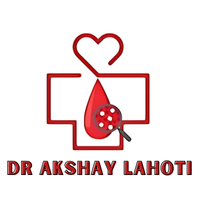leukemia specialist doctor in Indore

What is Leukemia?
Leukemia is a disease where the body starts making too many unhealthy white blood cells. These cells push out the healthy ones, making it harder for your body to fight infections and carry oxygen. This can cause symptoms like fever, tiredness, bleeding, or frequent infections.
Dr. Akshay Lahoti, a trusted leukemia specialist doctor in Indore, explains everything in simple terms so patients and families understand their condition fully.
Causes of Leukemia
While the exact cause of leukemia remains unclear, certain factors are known to increase the risk:
Genetic Mutations
Abnormal changes in DNA can trigger the growth of cancerous cells.
Family History
A family history of leukemia increases the likelihood of developing the disease.
Radiation Exposure
High doses of radiation, such as from cancer treatments or nuclear accidents, elevate risk.
Chemical Exposure
Prolonged exposure to chemicals like benzene, found in industrial settings, can lead to leukemia.
Other Disorders
Conditions such as sickle cell anemia, lymphoma, or certain syndromes can predispose individuals to leukemia.
How Common is Leukemia?
Leukemia is one of the most common types of blood cancer, affecting thousands of people in India every year. While it can occur at any age, certain types are more common in children, while others affect adults more often. Early diagnosis is important because timely treatment can greatly improve recovery chances. If you or a loved one shows symptoms like frequent infections, unexplained bruising, or constant tiredness, it’s important to consult a leukemia specialist doctor in Indore. Experienced experts like Dr. Akshay Lahoti use advanced tests and treatments to detect and manage leukemia effectively, giving patients the best chance for recovery.
Symptoms of Leukemia
The symptoms of leukemia often vary depending on the type and stage of the disease. However, some common warning signs include:
- Persistent fatigue or weakness
- Frequent infections
- Easy bruising or prolonged bleeding
- Swollen lymph nodes
- Pain in bones or joints
- Unexplained weight loss

Dr Lahoti and his team at Medicare Hospital in Palasia, Indore, uses advanced tests similar to this to help patients.
Complications of Leukemia
Leukemia can cause numerous complications, including:

Frequent Infections
The abnormal white blood cells fail to protect the body, leaving the immune system vulnerable.

Anemia
A shortage of red blood cells can cause fatigue, shortness of breath, and pale skin.

Excessive Bleeding or Bruising
Low platelet counts make it difficult for the blood to clot, increasing the risk of internal and external bleeding.

Enlarged Organs
The liver, spleen, or lymph nodes may swell due to an overload of abnormal cells.
Effects and Side Effects of Leukemia Treatment
Effects of Treatment:
- Improved survival rates
- Reduced risk of relapse
- Restoration of normal blood cell function
Side Effects:
- Nausea, vomiting, and loss of appetite
- Hair loss
- Risk of secondary infections
- Fatigue and weakness
- Long-term organ damage
While side effects can be challenging, advancements in supportive care help manage them effectively.
Tests to Determine Leukemia
- Complete Blood Count (CBC): A basic blood test that reveals abnormal levels of white blood cells, red blood cells, and platelets.
- Peripheral Blood Smear: A sample of blood is examined under a microscope to detect abnormal cells.
- Bone Marrow Biopsy: A small sample of bone marrow is extracted to check for cancer cells.
- Cytogenetic Testing: This test identifies genetic changes in blood cells.
- Flow Cytometry: Analyzes cell properties to determine the type of leukemia.
- Lumbar Puncture: Checks for the presence of leukemia cells in the cerebrospinal fluid.
Early diagnosis is critical, as it significantly improves treatment success rates.
Treatment for Leukemia
Treatment for leukemia depends on the type and stage of the disease, as well as the patient’s age and overall health. Common treatment approaches include:
- Chemotherapy: The primary treatment for leukemia, chemotherapy uses drugs to kill abnormal cells.
- Radiation Therapy: High-energy rays target and destroy cancerous cells in specific areas.
- Targeted Therapy: Drugs are used to block specific proteins or genes responsible for the cancer’s growth.
- Immunotherapy: Boosts the immune system to help the body fight cancer.
- Bone Marrow Transplant (BMT): This procedure replaces diseased bone marrow with healthy stem cells, offering hope for patients with severe leukemia.
- Supportive Therapy: Includes medications to manage symptoms like anemia, infections, and bleeding.
At Medicare Hospital, Dr. Lahoti provides personalized treatment plans for each patient. His expertise ensures that patients receive the most effective therapies with minimal side effects
Frequently Asked Questions
Common symptoms include feeling very tired, getting sick often, easy bruising or bleeding, pale skin, and shortness of breath. If you notice these symptoms, it’s best to consult a hematologist doctor at Palasia.
Pancytopenia can be caused by bone marrow problems, cancers like leukemia or lymphoma, infections, autoimmune diseases, or chemotherapy. Dr. Akshay Lahoti, the best doctor for blood cancer in Indore, is experienced in diagnosing and treating these causes.
Doctors diagnose Pancytopenia using blood tests like a Complete Blood Count (CBC) and may also perform a bone marrow biopsy to see how well the bone marrow is working. If you are in Indore, visiting a blood cancer doctor in Indore at Medicare Hospital is recommended.
Yes, Pancytopenia can be treated. Treatments include medications, blood transfusions, and in some cases, Bone Marrow Transplant. Dr Akshay Lahoti has over 7 years of experience in performing bone marrow transplants for conditions like Pancytopenia.
Tests like bone marrow biopsy, infection tests, and immune system tests help doctors determine the cause of Pancytopenia. If you are in Indore, consult Dr Akshay Lahoti, a hematologist doctor in Indore, for these tests.
Yes, Pancytopenia can affect people of any age, including children, especially those with cancers, infections, or other bone marrow problems. Dr Akshay Lahoti, a hematologist doctor at Palasia, provides expert care for patients of all ages at Medicare Hospital in Indore.
